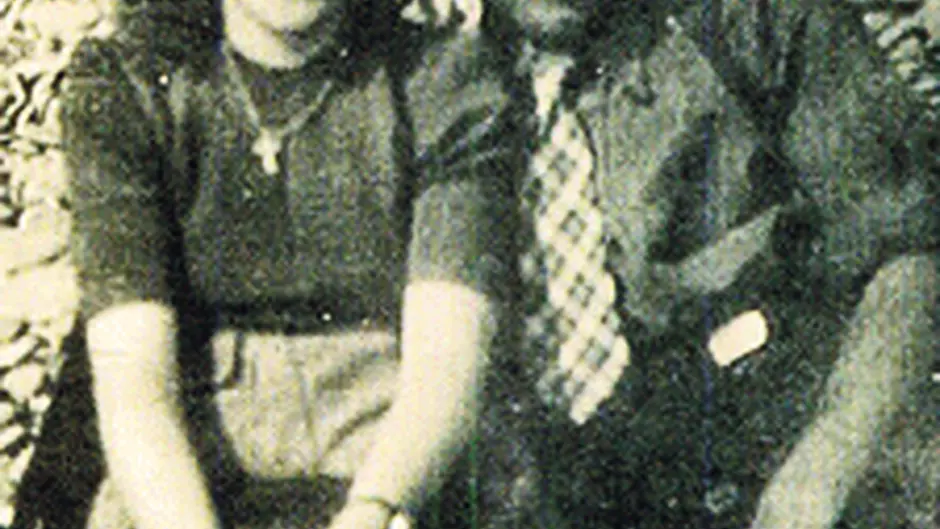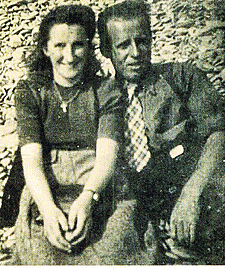At almost ninety-three years of age, Hughie O'Donovan is larger than life and still living it to the full. A refreshing change, some might say, from the dastardly cads to be found on today's dating scene. And he is, quite literally, and in his own words, 'the last man to let you down'- because Hughie is the proprietor of O'Donovan's funeral home in Bandon.
AT almost ninety-three years of age, Hughie O’Donovan is larger than life and still living it to the full. A refreshing change, some might say, from the dastardly cads to be found on today’s dating scene. And he is, quite literally, and in his own words, ‘the last man to let you down’– because Hughie is the proprietor of O’Donovan’s funeral home in Bandon.
Like many Irish men, the way to Hughie’s heart proved to be via his stomach. At the time, he was working as a contractor, spraying crops for local farmers.
Mary, the daughter of one of these farmers, first caught Hughie’s eye when she was sent out to the field to bring him some tea and brown bread. A few days later, a neighbour approached him, telling Hughie that he had a ‘nice girl’ for him. As fate would have it, it turned out to be the same lady.
An ‘appointment’ was duly set up for the two to meet. An appointment, Hughie tells me, consisted of a couple meeting at the side of the road or at the crossroads and going for a walk. These were often clandestine affairs, as Hughie explains:
‘You daren’t go into the house to meet – it was completely different in our day. You wouldn’t want anybody to know you were meeting – some parents would think their family would be marrying beneath them. Many’s a couple went away to England or America trying to make a living for themselves because they weren’t wanted at home.’
It would appear that single women of the 1930-1940s had perhaps more realistic expectations than their modern day counterparts – a potential suitor might bring a box of chocolates if they really wanted to impress a lady but that was about it.
All going well, the next step in a burgeoning relationship would be attending dances together. A far cry from the late night pubs and clubs of today – they took place on a Sunday evening at the far more respectable hour of 7pm or sometimes even earlier. Dances could take place either indoors or outside, on a platform. A platform was a smooth, square of cement.
A man playing piano accordion would sit at the back of the bank, providing the musical entertainment. There was no ‘Gangnam Style’ for Hughie and his friends – sets and waltzes were the order of the day. With no Hailo phone apps, let alone taxis, to be had, many young people travelled on foot from miles around to attend a dance. If he was lucky enough to be in possession of one, Hughie tells me that a lady might be offered a ‘crosser’ home on a young man’s bicycle.
But it was never acceptable to take several different ladies to these dances. ‘No – you were either friendly with a girl and one girl only – or you weren’t,’ notes Hughie. ‘There’s a lot of flirting around these days – there’s no sincerity. And when you’ve no sincerity, you’ve nothing – you can’t depend on someone.’
I ask Hughie is he familiar with the dating app Tinder? He replies he is aware of it, but admits that he doesn’t know too much about it. ‘People are only in it for the devilment – they want to try out different men and different women,’ he comments.
In contrast to modern day matchmakers such as Avril Mulcahy who firmly believes that men should do the pursuing, Hughie has a refreshingly enlightened approach: ‘I really think that if a woman has an interest in a man, she would be right and proper to ask him out – some men are very shy – but they’re only human beings, like women.’
Hughie attributes the high rate of relationship breakdown in Ireland today to young people being in too much of a hurry to get hitched. Hughie himself courted the late Mary for six years before going on to enjoy sixty years of wedded bliss.
‘They don’t look before they leap. They rush into marriage and the next thing they’re offended and and they’re gone. Then any other girl won’t have him, she’ll say to herself “he was married before” and the poor fella was hardly married at all.’
Interestingly, Hughie observes that couples in cohabitating relationships seem to fare better than some married people.
‘The couples that are living together – and living together with years – seem to be much more happy. Is it because they’re free to go at any time and they just don’t want to go?’









